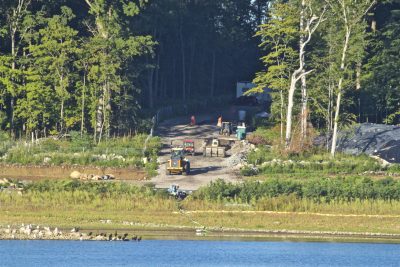Cleanup of Granite Pointe Continues as Residents Remain Vigilant
News Based on facts, either observed and verified directly by the reporter, or reported and verified from knowledgeable sources.

Granite Pointe, an approved 23-unit housing subdivision in Somers that dates back to 1988, was granted a 28th 90-day time extension by the town’s Planning Board last month.
The project, which received final approval by the Planning Board in 2015 following several legal challenges, remains unbuilt while the state Department of Environmental Conservation (DEC) continues overseeing the comprehensive cleanup of lead-impacted soils on the 29-acre property that abuts the Amawalk Reservoir through the State Superfund Program to ensure protection of public health and the environment.
According to Denis Slattery of the DEC, “active construction activities associated with the cleanup” were completed as of June 14 – two days after the town’s most recent time extension.
However, Slattery noted in an e-mail responding to questions posed by Examiner Media, “The site is currently within a one-year restoration warranty period in which the contractor (John Harkins) is required to establish vegetation, maintain sediment and erosion controls, and repair washouts or erosion resulting from precipitation events.”
“Following successful completion of the cleanup, the site may be reclassified from Class 2 (a significant threat to public health or the environment) to C (completed),” Slattery stated. “Under the State Superfund Program, DEC reserves all rights to pursue responsible parties for the costs it will incur in the cleanup.”
The cost of the cleanup has been estimated between $8 million and $12 million.
Protecting drinking water is a top priority of the state, according to the DEC. The Amawalk Reservoir delivers drinking water for about 35,000 to 40,000 Yorktown and Somers residents.
At a June 13 Somers Town Board meeting, several speakers addressed the board about Granite Pointe.
“It just astounds me that we could destroy a forest as a municipal water supply,” said Yorktown resident Regina Blakeslee, a retired healthcare professional. “Think of the people. Think of the creatures that help our land here. What about future generations? Once it’s done, it’s done.”
Diane Houslanger of Somers questioned why the Town Board didn’t declare itself lead agency with Granite Pointe given its large environmental impacts.
“The public demands to know why you remain mute and silent on the people’s exhaustive demands to you over the years and decades, urging you to assume lead agency role for the Granite Pointe forested promontory on Amawalk Reservoir, to rescue this environmentally, and drinking water critical site from unfair death row placed by your Planning Board, and to protect and preserve it as open space in perpetuity for environmental and drinking water protection,” she said.
Somers Supervisor Robert Scorrano responded by saying none of the current board members were in office when Granite Pointe was being reviewed.
“When this started, I think I was 10 years old,” Scorrano said. “It’s important that the public recognize this is not something that happened overnight.”
Fred Higham, a 45-year resident of Somers, insisted it was “time to turn the page to develop a sound environmental solution for Granite Pointe that fits our town’s current conditions.”
Armed with posters and photos, Higham urged town officials to “think and reach outside the box.”
“Buy Granite Pointe and protect this precious piece of land forever,” he said. “It’s time to stop this. Stop this before it gets out of the barn here.”
Several calls and e-mails placed to Harkins were not returned.
When asked if the DEC had any interest in purchasing the property for preservation, Slattery issued the following statement: “DEC’s role in site redevelopment is to ensure that the approved cleanup plan is completed and protective of human health and the environment, consistent with local zoning requirements. Additionally, the cleanup of the site to unrestricted use means there will be no restrictions to future land use imposed by DEC, only those identified by local zoning or the SEQR (State Environmental Quality Review) process.”

Rick has more than 40 years’ experience covering local news in Westchester and Putnam counties, running the gamut from politics and crime to sports and human interest. He has been an editor at Examiner Media since 2012. Read more from Rick’s editor-author bio here. Read Rick’s work here: https://www.theexaminernews.com/author/pezzullo_rick-writer/
